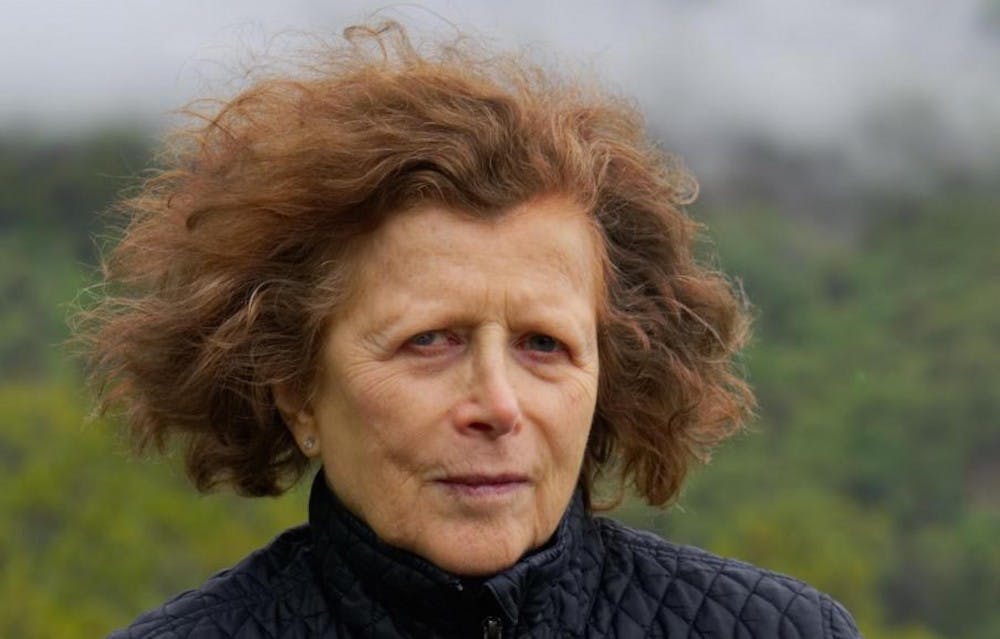I am not the most adept at poetry. I often shirk away from poetry readings, which deny me the comfort of meditating over lines and stanzas, rotating them in my mind until they yield some sense. I need time to read poetry, so when I decided to attend the reading for Iris Tillman-Hill’s newly released, “All This Happened Long Ago – It Happens Now,” I did so with a touch of apprehension. What was there to expect? Would it be too academic for me to handle?
But what welcomed me upon my attendance of her poetry reading was not an erudite, ephemeral echochamber, but rather something golden-warm that filled the room. Tillman’s poetry was a reckoning with her past that was simultaneously personal and universal in its urgency to understand where we come from and how our understanding of the past shapes our self-conception. I felt her poetry as a common experience, despite our demographic differences, and others did, too.
“After the reading at Duke, one of the people I have known for a long time who has a Chinese background came up to me, and she was very moved by the poem,” Tillman said in an interview. “She said, ‘This is my family story, too. We knew our family came from southwest China, as you knew your parents came from Russia ... and they never talked about their past and where they came from.’ So [this poetry collection] is such an American story because we are all immigrants, and for many of us, we are people of diaspora.”
Tillman’s poetry collection came about as a method of self-understanding as she endeavored to piece together her family history from the few stories and names she’d carried out of her childhood and young adulthood. Tillman identifies as culturally Jewish, and the rapid diffusion of digital resources for tracking Jewish genealogy permitted her for the first time to mine her family’s past.
Nonetheless, a blunt sense of urgency also underlied her venture: the Holocaust, which imprinted itself on her childhood and refused her any respite in ignoring the past, had also ravaged the villages and towns her family had once called home. What was once alive had quickly become artifact, and even the artifacts were soon becoming rubble.
Though Tillman’s parents staunchly denied that she was related to anyone who had perished in the Holocaust, her research into her family tree has suggested otherwise. Born and raised in Brooklyn, New York, Tillman’s American childhood placed a bubble around the Holocaust that her research has allowed her to permeate.
So Tillman pieced together her family’s history from the wayward snippets of information she could gather. Her poetry relives and reenacts these stories that are both mythological and intensely personal, informed by both the wonder of her child self and the clarity she has gained through her intensive research. The past is warped, she implies, and thereby it distorts the present, working it into grooves and twists.
In “What I Owe Schepsel Merle: 1878-1940,” for example, Tillman carries the reader through this very process of mythology to elucidate a sharp irony: more knowledge of one’s past simply colors the myth instead of humanizing it. With little knowledge of her grandfather, she first imagines him as an orphan somehow willed into existence, with no past to serve as his explanation.“Someone tossed him on a heap of pelts, said sleep,” she writes, “So he slept beside the eye of a fox.”
As she collects his history, his “cavalry papers,” and “charm,” he becomes more concrete, more real. Yet the mythology remains, for when Tillman finds out that he had named her Ruchel, after his mother, a new godlike figure emerges: here is Ruchel, “carrying wild daisies, singing a lullaby.”
Though our attempts to make sense of history is universal, Tillman’s reckoning with her family’s past is uniquely tragic, and her search for understanding is particularly poignant. Her grandparents and parents denied their past as a method of survival, for that all-too-recent past was plundered and decimated by the Nazis during the Holocaust.
Tillman has just enough distance to engage that past, and by doing so she reignites a history that the Nazis deliberately and violently attempted to destroy, a history that even today is rarely memorialized in countries like Ukraine, one of her family’s homelands. Her elucidation is all too necessary, for it reaffirms herself, her identity and her humanity.
“My grandparents left ... but the horrors of what happened for the people that stayed behind is hard to conceptualize, hard to imagine,” Tillman said. “They were wise to forget, maybe for themselves to survive, but they were not wise to forget for us.”
In arguably the best poem in the collection, “Heritage Tour: Day Four,” Tillman visits an old site in Ukraine where Jews and Poles lived side by side. The site is abandoned and barren, yet its verdant, grown-over nature reminds her of land she owned in Appalachia.
“This is the way we find life in decay,” she writes, “The hibiscus caught in a gate, bent in regret, flowering.”
“The hibiscus was an image that came to me while working on the poem,” Tillman said. “When visiting homes like these in Appalachia, you are so aware that people had lived in these now abandoned houses with their families, and sometimes you see the apple trees they had or a beautiful hibiscus growing. There’s this notion that something beautiful survives in something lost or ravaged.”
In Tillman’s poetry collection, past is present and present is past, and we are the vessels that merge them together. She reminds us that all that happened long ago can and will happen now.
Get The Chronicle straight to your inbox
Signup for our weekly newsletter. Cancel at any time.

